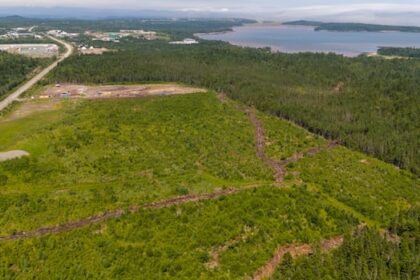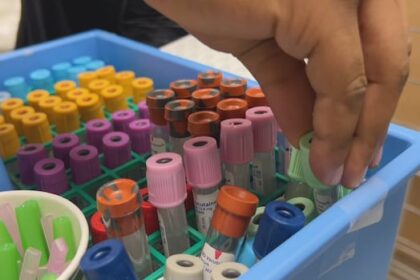Published Mar 29, 2025 • 4 minute readPremier Tim Houston speaks to reporters in Halifax in January. Photo by Francis Campbell /The Chronicle HeraldThe the Assembly of Nova Scotia Mi’kmaw Chiefs says its fervent opposition to fracking in the province could result in legal action.In a letter sent to Premier Tim Houston on Thursday, the 13 signing chiefs said they oppose hydraulic fracking and “will not see it happen in our unceded and traditional territory.”In a news release Friday, the Assembly said it is considering filing an injunction into the provincial government’s law-making process on hydraulic fracturing and uranium mining.THIS CONTENT IS RESERVED FOR SUBSCRIBERS ONLY.Subscribe now to access this story and more:Unlimited access to the website and appExclusive access to premium content, newsletters and podcastsFull access to the e-Edition app, an electronic replica of the print edition that you can share, download and comment onEnjoy insights and behind-the-scenes analysis from our award-winning journalistsSupport local journalists and the next generation of journalistsSUBSCRIBE TO UNLOCK MORE ARTICLES.Subscribe or sign in to your account to continue your reading experience.Unlimited access to the website and appExclusive access to premium content, newsletters and podcastsFull access to the e-Edition app, an electronic replica of the print edition that you can share, download and comment onEnjoy insights and behind-the-scenes analysis from our award-winning journalistsSupport local journalists and the next generation of journalistsRegister to unlock more articles.Create an account or sign in to continue your reading experience.Access additional stories every monthShare your thoughts and join the conversation in our commenting communityGet email updates from your favourite authorsSign In or Create an AccountorArticle content“Environmental racism is a real thing,” Michelle Glasgow, co-lead of the Health, Wellbeing and Elders portfolio for the Assembly, said in the release.“The province of Nova Scotia and Premier Houston are making decisions and moving at a speed that appears to be rooted in racist and colonial practices,” said Glasgow, elected as the first female chief of the Sipekne’katik First Nation in November 2022.Houston and the Progressive Conservative majority government raised the fracking and mining narrative in January, after winning 43 of 55 seats in the November provincial election.In a letter to the PC caucus dated Jan. 21, Houston said Nova Scotia is blessed with “untapped opportunities primarily because governments before ours lacked the courage to act on them.”He said previous governments “bowed to special interests” but urged his caucus and cabinet colleagues to have the “grit, determination and political capital” to stand up industries like hydrogen, wind and mining, namely lithium, uranium, coalbed methane and natural gas.“Outright bans of entire sectors are lazy public policy and we will reverse bans and focus on meaningful, mature discussion,” Houston wrote in the letter.Article contentThe premier reiterated much of that letter in a paid advertisement that commanded the entire front page of the Jan. 25 edition of The Chronicle Herald. Nova Scotia Premier Tim Houston and Leah Martin, the minister responsible for the Advisory Committee on the Status of Women, announce funding targeted at combating intimate partner violence at Province House in Halifax earlier this month. Photo by Francis Campbell /The Chronicle HeraldDuring the spring session of the legislature that ended on Wednesday, the Houston government tabled and eventually passed an omnibus bill that amends the Petroleum Resources Act to create the potential for hydraulic fracturing to access onshore natural gas and repeals the Uranium Exploration and Mining Prohibition Act to allow research about uranium’s presence and distribution in the province.“We have to grow the economy of this province if we want to continue to provide the services” that Nova Scotians want and expect, Houston told reporters in wrapping up the House session. “Lifting the bans on uranium, lifting the bans on natural gas and saying we are going to have a discussion on how this (fracking) can be done safely is really important,” Houston said.Glasgow said in the Assembly release the government continues to “marginalize the voices, position and concerns of the Mi’kmaq.”The Assembly release referenced a March 7 meeting with Assembly members, Houston and L’nu Affairs Minister Leah Martin to discuss concerns with and opposition to lifting bans on hydraulic fracturing. Article contentThe Assembly says Houston publicly commented to the media that a meeting occurred, “leaving the public to speculate that the Mi’kmaq were properly consulted and/or on board with these recent provincial decisions. “These implications are inaccurate and skirt the truth about how discussions with the Mi’kmaq are really going,” the release reads.Houston told reporters this week as the legislature session wrapped up he had a “productive” meeting with the Assembly.Glasgow said the Assembly made it clear to the premier that “the Mi’kmaq have always opposed hydraulic fracturing and that there has been no meaningful consultation on provincial decisions to reverse bans on hydraulic fracturing.”At their meeting with the premier, the Assembly says it had in-depth conversations, raising their concerns that Nova Scotia has been dismissing the self-governing rights of the Mi’kmaq and that decisions are being made about the lands and waters in the unceded and traditional territory of the Mi’kmaq, without any real consideration of the rights holders. “Although Nova Scotia has publicly said they are open to having conversations with stakeholders, they are forgetting to have conversations with Nova Scotia’s stake owners – the Mi’kmaq,” said Chief Terrance Paul, fisheries co-lead for the Assembly.Article contentThe Assembly also has grave concerns about what this could mean for project sites that they have already fought to protect in the past, such as the Alton Gas and Lake Ainslie sites.“If technology has changed, as Premier Houston claims, we invite him to share that evidence and data with the Mi’kmaq,” said Paul, longtime chief of the Membertou First Nation.“Until then, we will continue to be against fracking in our territory”.Glasgow said the Assembly worked hard more than a decade ago to ensure that safeguards were put in place to protect the interests of everyone who calls Mi’kma’ki home. “Fracking is a destructive, irreversible and exploitative industry, and the moratorium put in place kept this harsh practice out of our lands and waters,” Glasgow said. “It is our responsibility to use our rights and title claim over these lands and waters to help protect it from this harmful industry,” she said.Speaking at the annual Prospectors and Developers Association of Canada conference in Toronto in the early days of March, Houston said Nova Scotia has the critical minerals the world needs for clean energy, food production, defence and health care.Article content“We can be a reliable, ethical, sustainable source of these materials and reap the economic rewards for Nova Scotians,” Houston said.The Assembly said in an initial early March letter to the premier that none of the government pronouncements on fracking, uranium mineral exploration or lithium mining development were included in the Progressive Conservative party’s campaign platform during the recent fall election.“It is very concerning that our provincial government is proposing such dramatic changes in sectors for which they did not receive a mandate from the people of this province,” the Assembly said in that letter.Article content
Mi’kmaw chiefs consider legal action against fracking in N.S.











